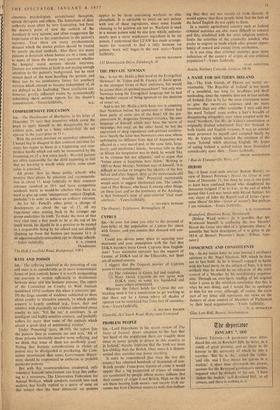THE PRIVATE NEWKAN
SIR,—Is not Mr. Hollis a-little hard on the Evangelical Newman? St. Teresa and St. Francis of Assisi speak in the strongest 'terms of their sinfulness, but would he accuse them of spiritual masochism? Not only was Newman using the Evangelical language but he had the 'further excuse of being ignorant 'of the doctrine of venial sin.
And is not Mr. Hollis a little hasty too in assuming that Newman 'before • his conversion at fifteen had been guilty of some sins of the flesh? Of the pre- conversion St. Augustine Newman •remarks, 'He uses language of himself which may have the worst of meanings, but may oil the other hand, be but the expression of deep repentance and spiritual sensitive7 tiess.'Surely the latter was Newman's own case, whose upbringing (so different from that of Augustine) was effected in a very moral and, at the same time, large, lively, and intellectual family. Newman tells us that at fifteen his temptation was to think he would 'like to be virtuous but not religious,' and to argue that 'Virtue alone is happiness here below.' Writing in 1885 to-Anne Morley, Newman says of himself, 'it is .difficalt to realise or imagine the identity of the boy before and after Auguk, 1816, as the memoranda still undestroyed describe Itim Preserved memoranda would seem to suggest intellectual sins. The conclu- sion of Pe,rc Bouyer, who bases it, among other things, on these texts and'on the testimony of the Apologia, is that Newman's state of semi-unbelict"etait route cerebrale.'---Your faithfully,














































 Previous page
Previous page